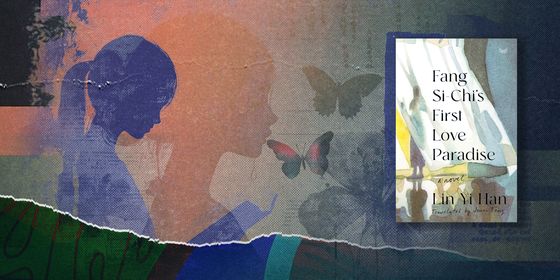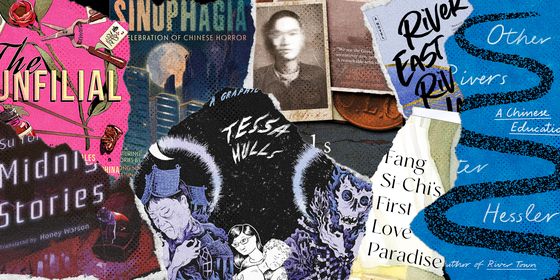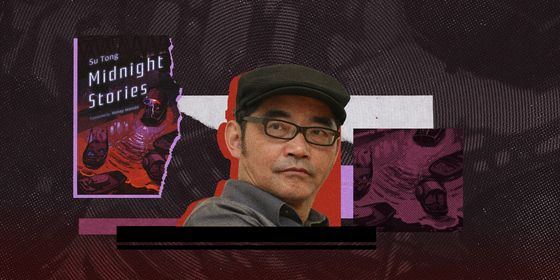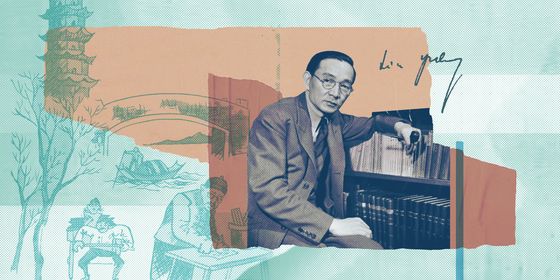Everybody Shareskyism, hwala-fuszji, and the importance of wearing trousers in Lao She’s sci-fi satire
It was condemned by the authorities, a commercial and critical flop, and even the author recognized it as a failure, but Cat Country has endured. Perhaps it’s because the criticisms of universal personal integrity ring true even today, perhaps because it’s the first great Chinese sci-fi novel, perhaps because it’s about Mars being inhabited by Cat People who dissect their teachers on graduation day—whatever the reason, this cynical satire looked bravely into China’s past, feared for the present, and pointed a very frightened eye at the future.
Cat Country, published in 1933 and translated into English by William A. Lyell, begins with a crash. A man, who for the sake of brevity shall be called Mr. Earth, is the sole survivor of a Chinese mission to Mars.
One might easily divide the novel into two parts—the novel and the exposition of why Cat Country has to die. When Mr. Earth first arrives, he soon finds himself a prisoner of the Cat People who, in a variety of ways, show themselves to be without character, honor, or bravery. The first half of the novel tries very hard to be great sci-fi, with scornful descriptions of creatures the narrator despises, but there’s also a paint-by-numbers style of world-building that sets the stage for Lao She’s takedown of China as a nation—in the shadow, mind you, of Western infiltration and in direct response to the Japanese invasion of Manchuria.
While the character Mr. Earth is far from likable (readers may find themselves on occasion rooting for cowardly, thieving Cat People in between his moralizing), he measures himself and those around him with a high bar. So, while he makes a great narrator for a story about a society putting itself on the brink, Mr. Earth isn’t exactly the type of astronaut with whom you’d want to have a beer.
Some of the observations regarding Cat Country in the novel are pretty thinly-veiled historical references. For example, you can’t understand Cat Country at all without understanding the “reverie leaf ”, an opium analog that dulls the mind and runs the nation. “One day, a foreigner brought some of the leaves to Cat Country,” Mr. Earth says. “At first only the upper classes could afford to eat them, but then they began to import trees and everybody became addicted.”
Mr. Earth’s first guide through Cat Country is Scorpion, a well-respected member of the landed gentry of Cat Country who owns a reverie leaf orchard and who is a model of complete despair for the present. Cowardice is king, laziness is expected, plagiarism is lauded, and rule of law is a laughable proposition. Taking oaths, for Cat People, was a game only children would play.
One surprising aspect of this early section of the novel is its distance; satire often likes to get in the nitty-gritty of sermonizing for only those in the know. This isn’t the case in Cat Country. Indeed, many English readers are put off by the language-specific complexity of Lao She’s reputation for cripplingly funny (and tragic) urban Beijing prose, but the narrator seems so alien to these Cat People that soon readers might find themselves wondering if anyone who hasn’t traveled abroad can understand it at all.
In this way, Mr. Earth becomes familiar with the culture of the Cat People, or lack thereof. Through the narrator’s escape, reverie leaf harvest, and journey to the capital, Lao She paints the Cat People as so selfish with “freedom” (or rather a concept of the word freedom in Felinese that means only “noncooperation and creating disturbances”) that it is a society doomed to rot in its own self-interest.
This brings us inexorably to Cat City, where Lao She abandons his sci-fi satire and concentrates on telling you exactly why the Cat People cannot survive. Mr. Earth does not mince his words: “As soon as I set eyes on Cat City, for some reason or other, a sentence took form in my mind: this civilization will soon perish!” Even the traffic (which is a system of constant beatings and being pushed) foreshadows the end: “In the eyes of Cat People, yielding the right of way was considered to be most disgraceful, and keeping to one side of the street was seen as incompatible with their freedom loving spirit.”
Thus far in the novel, Scorpion—with the exception of a few voyeurs, lowly soldiers, and reverie leaf pickers—was Mr. Earth’s only source of Cat People contact before Cat City, but in the capital Mr. Earth is introduced to Young Scorpion. The son of Scorpion is bright (for a Cat Person), affable, and willing to take pains, but his great sin differs from his father’s ambition and cowardice: he’s a pessimist.
One of the most oft-cited criticisms of Cat Country as a book is that it’s too pessimistic. Well, fart jokes would be a bit out of place in a seething satire of the Middle Kingdom in the early 1930s, but it is Young Scorpion who most embodies this spirit of cynicism and it is through his diatribes that readers come to truly understand Cat Country for the first time. Young Scorpion is married but practices “free love”, eschews all manner of social conventions, and looks at his country with a cynical enthusiasm that makes him seem almost happy to see his civilization die—at least at first.
“You see, as a pessimist, I readily grant that our people are retarded. The renaissance of a retarded people is bound to be a joke.” Each person in Cat Country props themselves up however they might but eventually all ends in tragedy: teachers on the verge of starvation hold out for an official position until their own students massacre them; the elder generation fawn over the fact that Cat Country was once advanced while the rest of the world was “still in a state of barbarism”, historians pawn off their ancient treasures for pennies; plagiarism is considered innovation; philosophers rattle on in languages they don’t even understand, blathering in foreign sounding words like hwala-fuszji and gulu-baiji (transliterations of Russian).
Such sycophants are the intellectuals of Cat Country that after hours of deliberation with a man from another planet, they only want to know about Mr. Earth’s trousers—why he wears them, if other foreigners wear them, and, “Does your honorable country have two classes, the trousered and the trouserless?” For those who see foreign-sounding words as a philosophical breakthrough, trousers are practically cogito ergo sum. In short, there doesn’t appear to be a person in Cat Country worthy of being saved besides the pessimist, Young Scorpion.
Politics, too, played their role, of course, in the country’s destruction. The word for “Party” in Felinese is “brawl”. To Cat People, democracy meant fighting, so democracy became fighting. Young Scorpion says, “In politics, we have had change but no reform.” Students gave up studying for politics and their ignorance let the few with enough ambition to bother run roughshod over the nation.
Though, in the history of Cat Country, there was one political philosophy that, at one time, trumped all the others: Everybody Shareskyism. “In this kind of political system, everybody is equal, everybody’s happy, and everybody’s secure...Each man is a happy, secure, and useful little bolt or cog.” This gave rise to a revolution like no other, but it, like all other political movements in Cat Country, was doomed to fail because of an inability to embrace responsibility. Those in charge of the Everybody Shareskyism were clueless as to how to properly run an economy or education system, and as Young Scorpion put it, “When all the killing was over, everybody just stood around and stared blankly at each other.” In the end, the leader of Everybody Shareskyism simply became the new emperor.
So, readers can see why the novel is often derided as too pessimistic. And while Scorpion is greedy and self-obsessed, and Old Scorpion is mired in the past, and Young Scorpion looks to the future with cynicism, there is, perhaps, one hero in the book. His name is Hawk. He sees Cat Country falling, he knows its hopeless and he’s prepared to sacrifice everything even though, in the end, it wouldn’t matter to anyone. To him, it didn’t matter if he succeeded because he saw all the various tragedies of Cat Country under one light: personal integrity. The government, the intellectuals, the students, the workers—all of them, he believed, would grow strong if they could just have found some personal integrity. He, at least, wanted to die with his.
The Cat People never really had a chance on their own, and when the symbolic Japanese invaders came knocking at their door, a cataclysm came for Cat Country.
Mr. Earth comes from a laudable nation (“Glorious China! Great homeland where there’s no cruelty or torture” sometime after 1933), so the pessimism of the piece is tempered, however lightly, with hope. Lao She’s Cat Country looks to the causes of the past and the brutalities of the present, but readers may be left wondering how far the writer looked to the future. Could he see, in some small way, some method of Everybody Shareskyism that would work? Could he see a victory for the Hawk-like people of his nation? Did he see that hot August day when a People’s Daily editorial would send students after people like him? Probably not. Cat Country isn’t a book of predictions; like all great satires, it’s a book of questions.
“Trekking Cat Country” is the cover story from our newest issue, “Agriculture”. To read the whole piece, become a subscriber and receive the full magazine. Alternatively, you can purchase the digital version from the iTunes Store.












